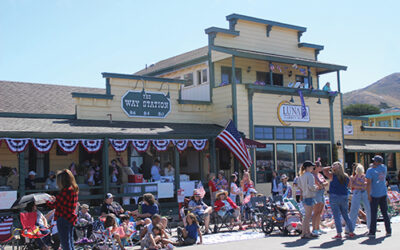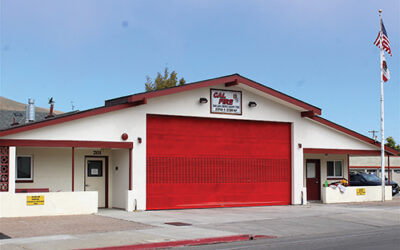Morro Bay voters on Nov. 8 will be asked to increase their property taxes to support City-owned harbor facilities.
Called “Measure B-22” or “Morro Bay Harbor Infrastructure Act” the item asks voters to increase their property taxes by $120 a year, or $10 a month, with annual increases tied to inflation. The measure applies to private property, both residential and commercial.
The measure’s authors — local residents Bill Luffee, Homer Alexander and Ron Reisner — have estimated the tax will raise some $680,000 a year and can only be used to repair, maintain or replace City-owned facilities — like docks, piers, seawalls, the launch ramp, and the rock revetment, among other structures and facilities.
Under the Measure’s language, none of the money can be used for employee salaries or benefits, “or any other matter, other than maintenance of and improvements to City owned harbor infrastructure.”
The tax would also apply to businesses that lease City property, i.e. the waterfront lease sites, labeling them “taxable possessory interests,” according the impartial analysis done by the City Attorney Chris Neumeyer.
Under the City’s agreement with the State Lands Commission, which ultimately owns all the tidelands leases (essentially the west side of the Embarcadero plus the water areas), monies from lease payments, dockage at the T-piers and City floating docks and slips, and offshore moorings, must be kept separate from the City and used for maintaining the harbor facilities and for the Harbor Department.
The agreement does not prohibit City Hall from pitching in on the department’s budget, which this past year it finally did. Ordinarily, City Hall takes far more money away from the Harbor Fund with its cost allocation payments, than it gives.
This situation exists even though the retail and restaurant businesses on the Embarcadero, along with the handful of expensive motels collect sales and bed taxes for City Hall.
The idea of taxing all private property owners in town to pay to maintain the harbor facilities is something entirely new.
The supporting argument that will appear in the Sample Ballots said, “There is more than $10 million in deferred maintenance and repair of the City’s waterfront/harbor infrastructure.”
It adds, “City liability for failures of the waterfront infrastructure would be huge.”
The argument is signed by Luffee as President of Friends of the MB Harbor Department; former Councilwoman Marlys McPherson; Jeremiah O’Brien, vice-president of the Commercial Fishermen’s Organization; Ken Vesterfelt a past Citizen of the Year; and Dana McClish a member of the Morro Bay Yacht Club.
The measure is opposed by four local residents, who all are members of the political group, Citizens for Affordable Living or CAL. They are Linda Donnelly, Kristen Headland, Dan Sedley, and Betty Winholtz, who is also a former Councilwoman.
CAL names three “red flags” with M-22. First that language in the measure, like with the use of the word “preventative” when referring to maintenance and capital improvements, “allows the tax money to be used for the Harbor’s operating budget, not just infrastructure” as the title implies.
Second red flag is the term “adjusted for inflation.” CAL argues “Who defines inflation each year? The annual adjustment is not tied to the CPI [Consumer Price Index] or other defined formulas.”
They claim that if the rate increase were 10% a year, the costs would start at $120, and jump to $132, $145, $159 and $175 by year five and topping $200 in year seven.
CAL’s third red flag involves the phrase “until ended by voters.” “There is no ending date as there are with some tax increases,” reads CAL’s argument against M-22. “Others would have to initiate a petition to get on the ballot, a measure, to eliminate this parcel tax.”
After questioning who would initiate such a move to eliminate the tax, CAL concludes, “It is not likely anyone would. So this becomes a forever tax that continues to climb exponentially.”
Normally with tax measures, the City would need to get two-thirds of the vote for a tax with a specified use, or a simple majority for a general tax. And while M-22 is specified to go to the Harbor Department for specific uses, because it was drafted and proposed by private citizens, under a special State Law it will need just a simple majority of votes — 50% plus one.
One other note, though M-22 applies to all private property, it is not an assessment district, so registered voters will decide it, instead of just property owners, which is how so-called Prop. 218 “protest” votes are done.
EBN readers can see the full text of Measure B-22 on the City’s website at: www.morrobayca.gov. On the Home Page, click on the “Election Information” button in the menu on the left side; then scroll down to “Measure B-22” and click on the “Full Text of Measure (draft ordinance)” button.


